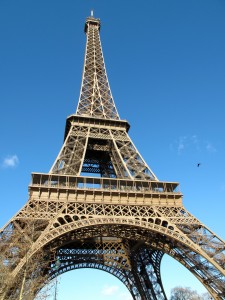 There are two ways to look at the Paris accords. The first way is that it is a step in the right direction: Countries have made promises to improve carbon emissions, report back every five years, and each five years promise to increase emissions reduction.
There are two ways to look at the Paris accords. The first way is that it is a step in the right direction: Countries have made promises to improve carbon emissions, report back every five years, and each five years promise to increase emissions reduction.
The emission reductions promised are substantial and will decrease warming substantially–if met.
The second way to look at it is that the emissions targets are not binding and are insufficient to avoid catastrophe in any case. Forests and oceans are still imperiled, the Pacific Islands are toast, and our coastal cities are goners. Because of self-reinforcing cycles which will see the release of vast amounts of methane stored in peat bogs, permafrost, and underwater, we were already probably past the point of no return some time ago. Far more drastic action was required; it was not taken.
Bend over and kiss your ass goodbye, in other words.
I tend towards the second view, which regular readers will find no surprise. However, it is interesting that Paris did include more substantial promises than have been included previously. Decision makers are far behind the curve, as usual, but they are beginning to take the problem seriously.
My default scenario indicates that by 2100, most coastal cities will have been flooded. A very few may survive with full dike systems. The default scenario used by the UN underestimates both sea-level and temperature increases, as it doesn’t properly account for vicious cycles releasing stored gases like methane, and those gases accelerate the process exponentially.
In addition, climate instability will increase. Rainfall patterns will change, there will be far more extreme weather events like hurricanes, and they will be more powerful. Parts of the world which are today inhabitable will become uninhabitable due to heat or lack of water. The amount of arable land will decrease significantly and we will have to convert to high-intensity agriculture techniques quite different from the ones we use today. Potable water will be a huge problem, and we will not have enough. Mass desalinzation and recycling will be the order of the day. We are going to lose most edible sea-life, and such seafood as we have will be mostly farmed, and quite a bit less healthy than wild seafood.
There are a vast number of knock-on social and economic affects of such a scenario, and we can expect to see mass migrations, a minimum of a billion incremental deaths (and I expect far more), which would not have occurred without climate change. There will be war and revolution, and so on.
Capitalism, as it exists now, is unlikely to survive these changes. It will be seen, and rightly so, to have been responsible for famines, genocides, and wars that will dwarf those of the 20th century. Collateral damage to other ideologies will occur, though it’s hard to say exactly how that will play out. Will “democracy” be discredited, or will it be reborn in a more robust form, for example?
I don’t, actually, think the Paris accords were the last chance. I think the last chance passed at Kyoto, years ago. The Paris accords are just another reminder of “too little, too late.” That said, whatever we do is worth doing, as it will reduce deaths and suffering. It is just not enough to stop the bulk of the damage.
If you are young, you will see much of this future. Be prepared. If you are older, your job is to prepare the world by changing existing ideas so that when real political and economic change happens (and it will, be sure of that), it changes in the best ways possible.
Because catastrophe will not be avoided, it is best to detach, mentally, and look upon the present and future as interesting times. Do what you can, know that there are billions of people, so your responsibility is only minor, and relax. History will wend its way.
If you enjoyed this article, and want me to write more, please DONATE or SUBSCRIBE.
